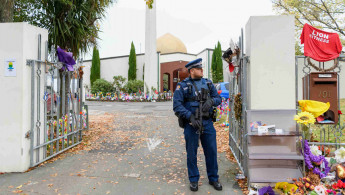Judicial probe opens into Christchurch mosque shootings
A judicial inquiry into whether New Zealand's police and intelligence services could have prevented the Christchurch mosque shootings in which 51 worshippers died began taking evidence on Monday.
The royal commission - the most powerful judicial probe available under New Zealand law - will examine events leading up to the March 15 attack in which a lone white supremacist gunman opened fire on two mosques in a mass shooting that shocked the world.
"This is a critical part of our ongoing response to the attack - the commission's findings will help to ensure such an attack never happens here again," Prime Minister Jacinda Ardern said.
New Zealand's spy agencies have faced criticism in the wake of the attack for concentrating on the threat from Islamic militants while underestimating the danger posed by right-wing extremism.
The Christchurch victims were all Muslims and the massacre was allegedly carried out by a white supremacist fixated on the belief that there was an Islamist plot to "invade" Western countries.
|
The commission is jointly headed by Supreme Court judge William Young and former diplomat Jacqui Caine.
It is due to report its findings by December 10, although it may release interim recommendations before then if it regards them as crucial to public safety.
Australian Brenton Tarrant, 28, a self-avowed white supremacist, has been charged over the attacks and is currently undergoing psychiatric testing to determine if he is mentally fit to stand trial.
The royal commission will examine Tarrant's activities before the attack, including how he obtained a gun licence, weapons and ammunition, and his use of social media.
Since the attacks, the government has tightened the country's gun laws and is reviewing legislation dealing with hate speech, as well as pressuring social media giants to do more to combat online extremism.
The terror attack was described by Prime Minister Ardern as "one of New Zealand's darkest days".
Follow us on Twitter: @The_NewArab





 Follow the Middle East's top stories in English at The New Arab on Google News
Follow the Middle East's top stories in English at The New Arab on Google News
![Israeli forces ordered bombed Gaza's Jabalia, ordering residents to leave [Getty]](/sites/default/files/styles/image_330x185/public/2176418030.jpeg?h=a5f2f23a&itok=_YGZaP1z)

